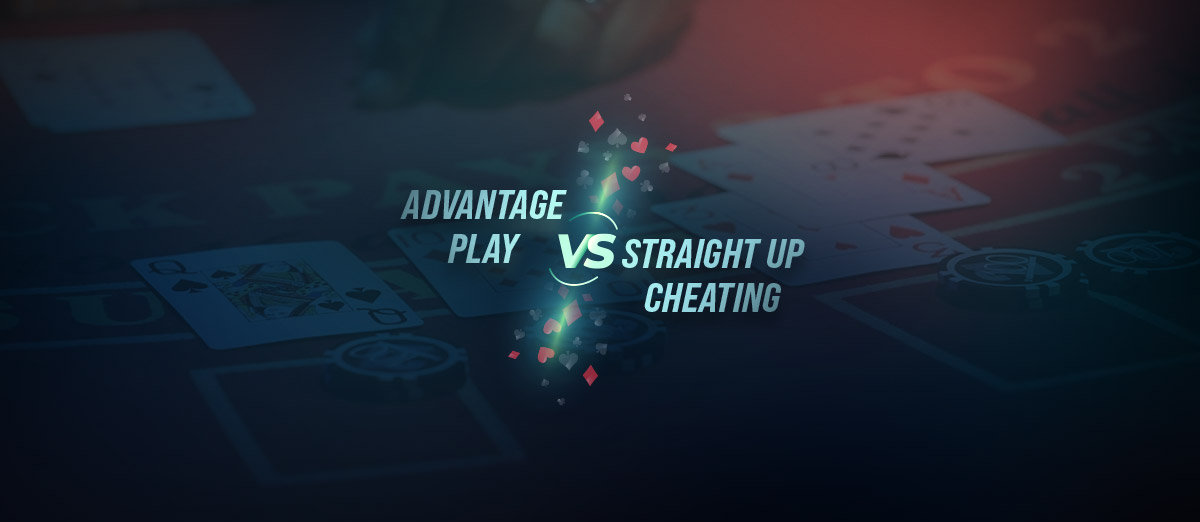Advantage Play vs. Straight Up Cheating – A Not So Fine Line

There's a difference between cheating and playing a perceived "fair" advantage that improves your odd, whether against the house or fellow players; therefore, it's important to recognize when you might be crossing the line between advanced strategy and outright theft.
I've always been curious why so many people - mostly those who do not gamble regularly - believe that card counting is cheating, and I suppose there are two answers.
Most people don't really understand what counting is or how to categorize it; their unreasoned logic being that if you don't just play the cards you're dealt and rely on luck, any other strategy must somehow be cheating.
Another answer is that the casino industry openly regards card counting or any type of advantage play as if it were a form of cheating, and this attitude filters down to the great unwashed, who perhaps follow the natural assumption that any covert strategy is somehow unfair to these poor, unfortunate gambling establishments.
I've even argued with non-gamblers who try to reason that because the house expects players to rely solely on luck and since (to their logic) the house is doing the same (which they're not), anything that perverts or skews the outcome in the players' favor must break some kind of implied contract.
This is ridiculous to anyone who has played 21 long enough to see odds cut or options deleted purely to funnel more cash into the casino's count room, but for people who have no skin in the game, it's easy to take the casino's side.
So Where Is the Line Drawn between "Advantage Play" and "Cheating"
And the answer is… it depends.
There are many variations on the basic card counting strategy where players track the values of cards already dealt (and placed into the discard tray) and make decisions about the remaining cards (still to be dealt) according to a pre-determined table of odds and outcomes that inform the card counter what to do under certain circumstances.
In the simplest terms, card counters pay close attention to what cards are being dealt in order to know what cards remain to be dealt, and the more high-value cards that remain to be played, the better for the card counters, so they bet more on each hand as their odds of winning increases.
This information is freely available to anyone who pays attention, and doing so does nothing to change the order of play. Yet many casinos openly regard (and refer to) this as cheating because, under the right circumstances, an expert team of card counters, like the MIT team in Vegas, can swing the odds to their favor giving every dollar they bet a positive expectation of return and believe it or not, casinos don't like that.
In fact, in the bad old days of casino management and security, card counters were often beaten up.
On one occasion, a notorious counter was spotted walking past a famous casino from which he was banned but only walked on the public sidewalk and never tried to go inside, but when he came back the other way, he was apprehended and redirected to the hospital.
Those days are (mostly) long gone, but casino staff have still been known to take extreme steps against winning players who they believe are playing an unfair advantage, and within the industry, there is a culture of "us versus them" that serves to only foster resentment on both sides.
Advantage players are simply processing information that's available to everyone and are doing nothing to change the outcome of the game (which would be cheating), but in years past, when the industry treated them like cheaters anyway, a few of those players came to the conclusion that they might as well be cheating for all the difference it would make to the outcome, should they get caught.
Eventually, crooked dealers began to get jobs in big casinos where they would short-shuffle the deck (giving it only one genuine shuffle after several completely fake shuffles) or protect a slug of cards in a known order and ensure those cards were cut to the top so his or her partners could enjoy multiple winning hands right out of a fresh shoe.
This, of course, is cheating, but given the rocky history between advantage players, casino owners, managers, and security, I'd argue that this kind of scam was the product of a needlessly acrimonious relationship. It's like being treated like a thief for reading the front page of a newspaper at a newsstand; you might as well steal the whole newspaper!
If the Risk Is the Same, Why Not Increase the Reward?
Modern casinos do a much better job of dealing with suspected card counters, politely backing them off or refusing their business rather than pulling them off their stool and tossing them down the stairs. That being said, I have still heard of casinos engaging in a practice that is far from fair whenever they identify a card counter, and I'll discuss that tactic in the next part of this series.
So, card counting can evolve into a form of cheating with the help of a dishonest dealer, a special chemical compound that marks the cards in a way only trained eyes can see, or countless other hare-brained schemes that trade hard work for the possibility of a hard time— but there's another angle to consider.
The Player Uses a Device to Aide Their Play Scenario
In the state of Nevada, players are forbidden from using any form of device to improve the accuracy of their decisions at a gaming table, and the use of such a device (if caught) could result in a seven-year booking inside Sin City's least salubrious accommodation.
Hidden computers with tiny keypads taped under one's pants can offer players an astonishing bump in expectation and can be applied to many strategies beyond basic counting, and while some human card counters can demonstrate an otherworldly ability to clock any number of decks, a computer is far more reliable for less gifted players.
We'll explore these machines later but for now, let's decide whether using them is cheating or not.
In my opinion, they are not a form of cheating since they only process available information, but they do it so well - and so consistently - that they represent a real risk to the casino's bottom line and therefore need to be hidden by players willing to do the work (and learn the skill) required to properly beat a game.
In the past, homemade computers were housed in small plastic boxes, and I remember - not so fondly - having one of these uncomfortable bastards taped to the small of my back then connected to a keypad on my thigh and an inductive loop at my shoulder, close enough to feed an audio signal to a tiny receiver in my ear. In fact, I was once so terrified of getting caught with that device I managed to panic my entire crew into bailing from a casino that actually had no idea what we were up to!
Where we played (in Europe), there were no device laws, so technically, we were playing both within the law AND within the rules, but while the law in Las Vegas has been engineered to make this kind of advantage strategy illegal, it is still not cheating in my personal (expert) opinion.
That opinion might be accurate, but that's no guarantee. In the UK, while I was flirting with concealed computers and working for a team of professional players at dozens of casinos, another team was caught using similar devices, and despite no laws against processing available game data with concealed computers, they were later found guilty and sent to jail!
And to laypeople, using a concealed device absolutely sounds like cheating.
We could argue all day about why that team was doing nothing illegal or immoral, but the truth is that perception is often more powerful than truth, and even in court, ignorance can be more persuasive than knowledge.
The Verdict
The line between cheating and playing with an advantage is far from clear, especially when interested parties such as the casino industry are allowed to shape the law or influence the application of that law.
In fact, the casinos once tried to argue that the human brain was a "device" when being used to count cards and that card counters were therefore breaking Nevada's device law. Fortunately, the judge recognized this argument for what it was: a clear statement that casinos would prefer that players not use their brains when playing at their tables.
So, to repeat:
Where is the line between advantage play and cheating?
It depends.





Review this Blog
Leave a Comment
User Comments
comments for Advantage Play vs. Straight Up Cheating – A Not So Fine Line